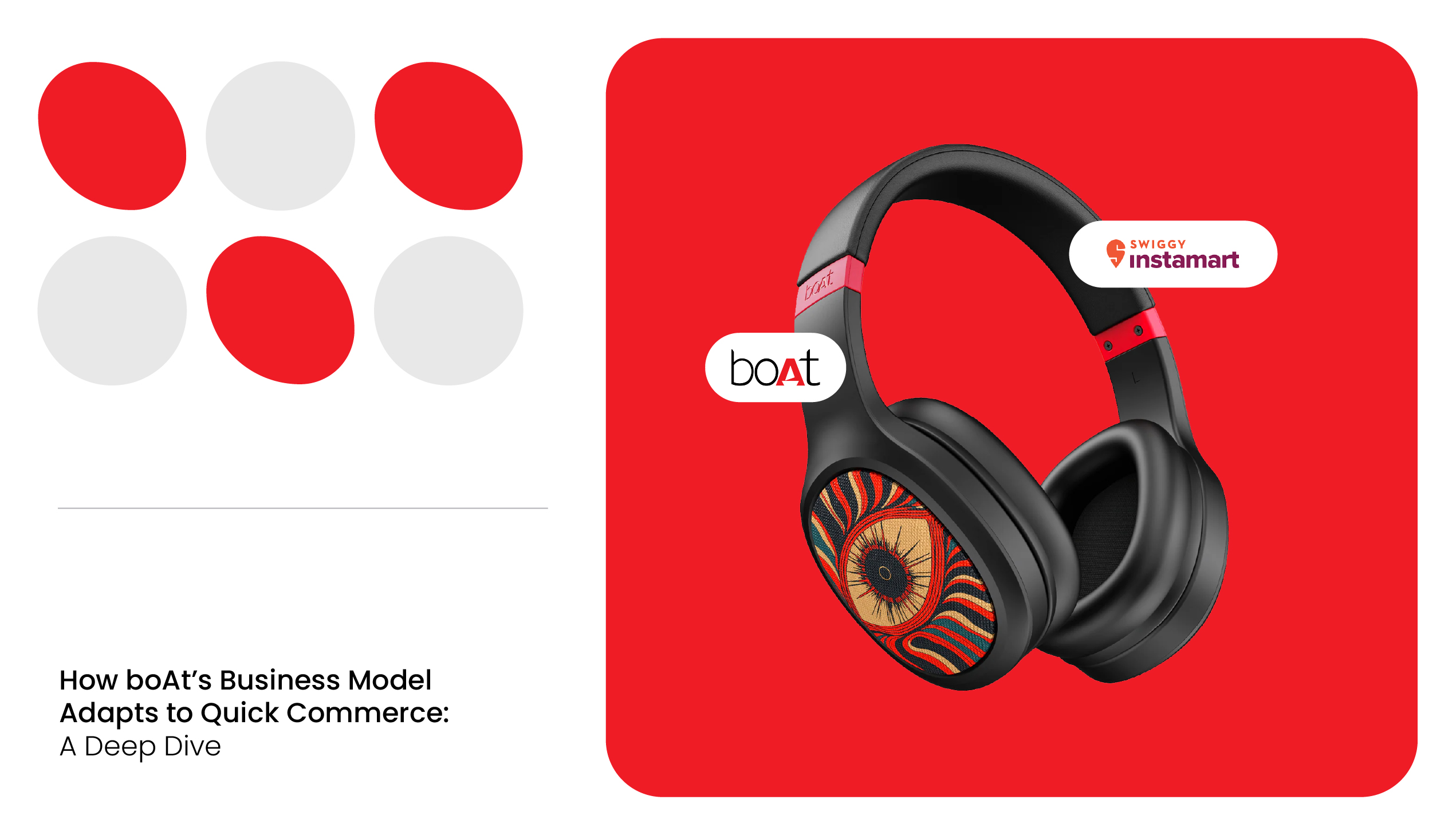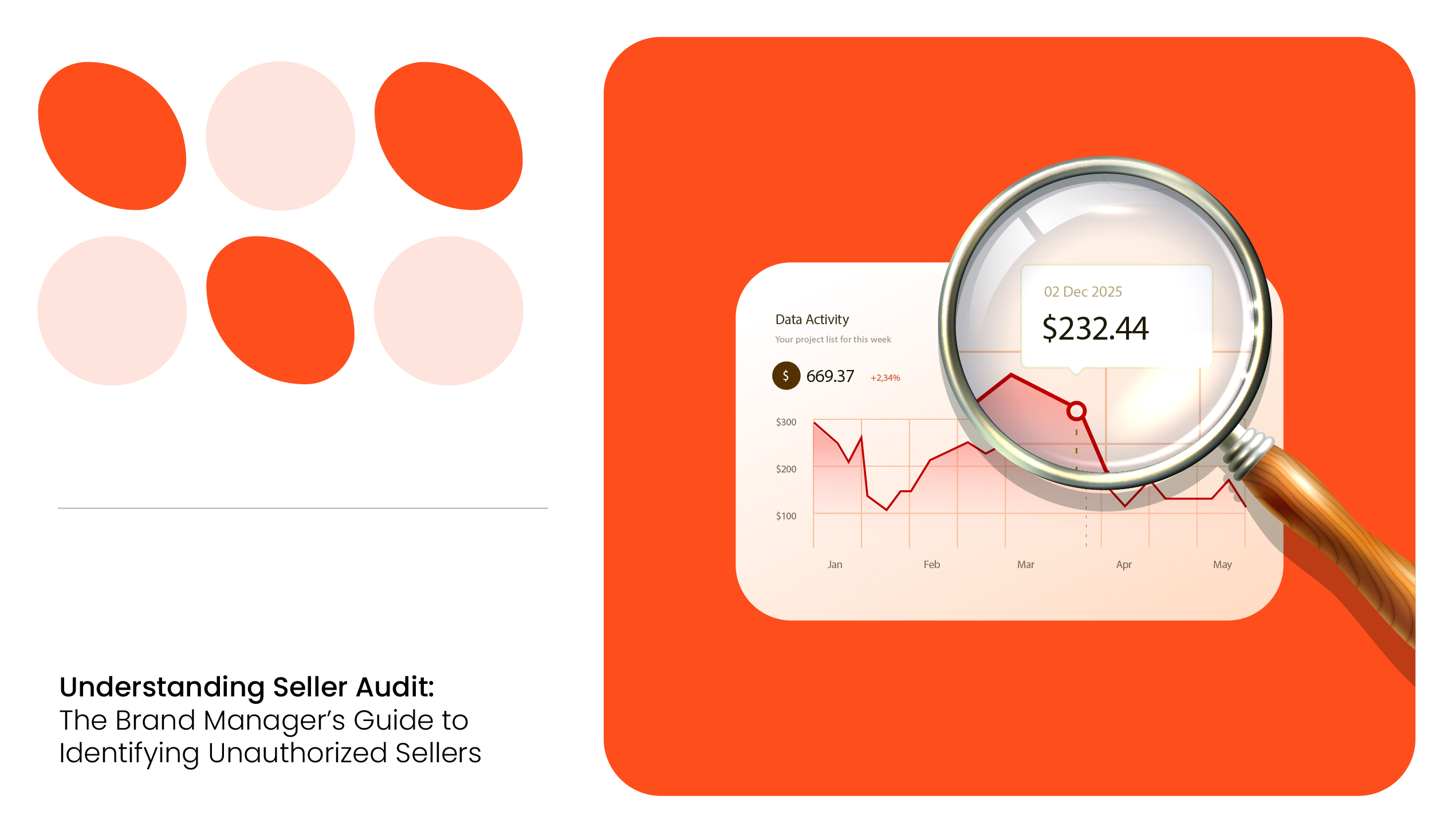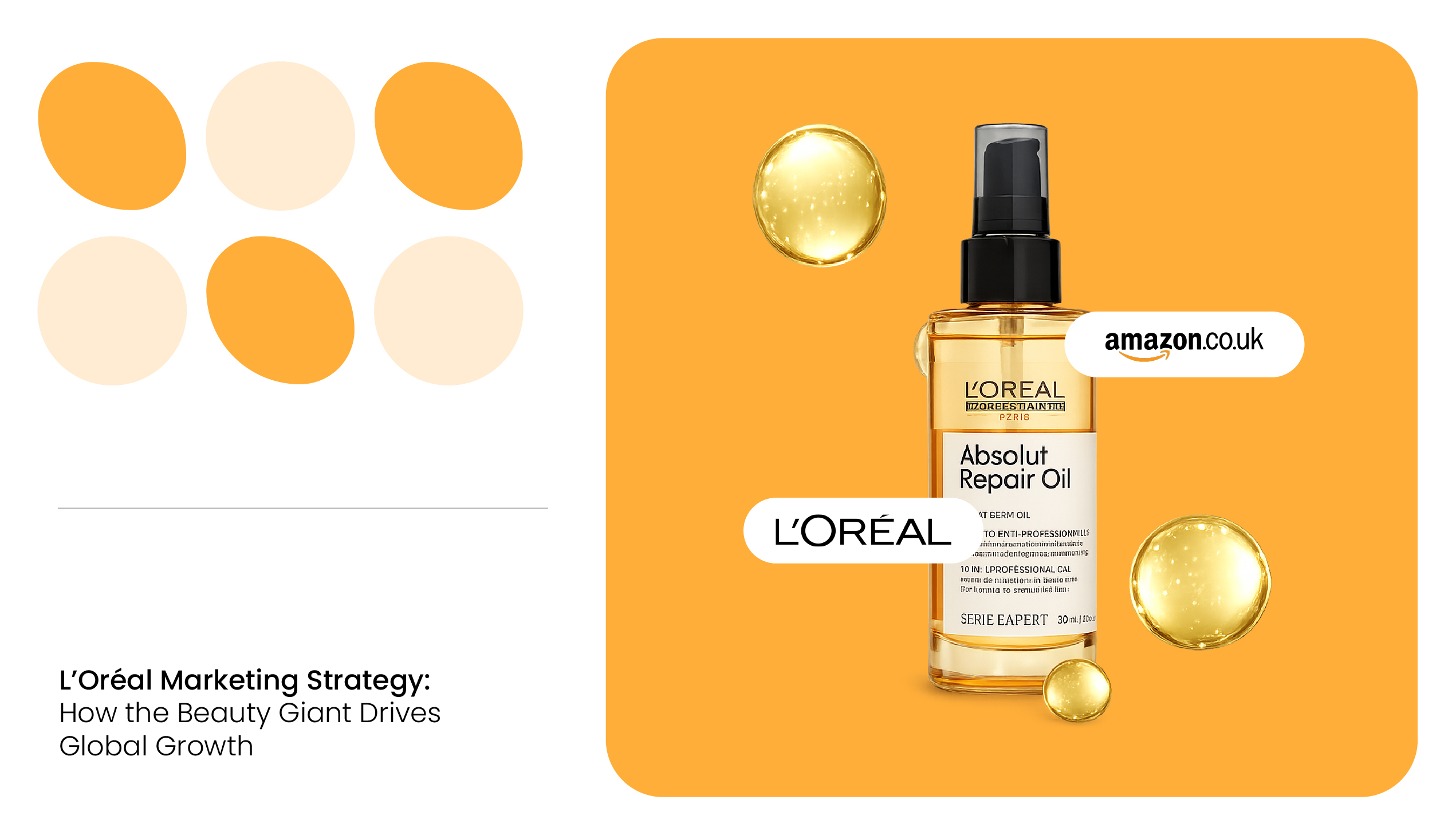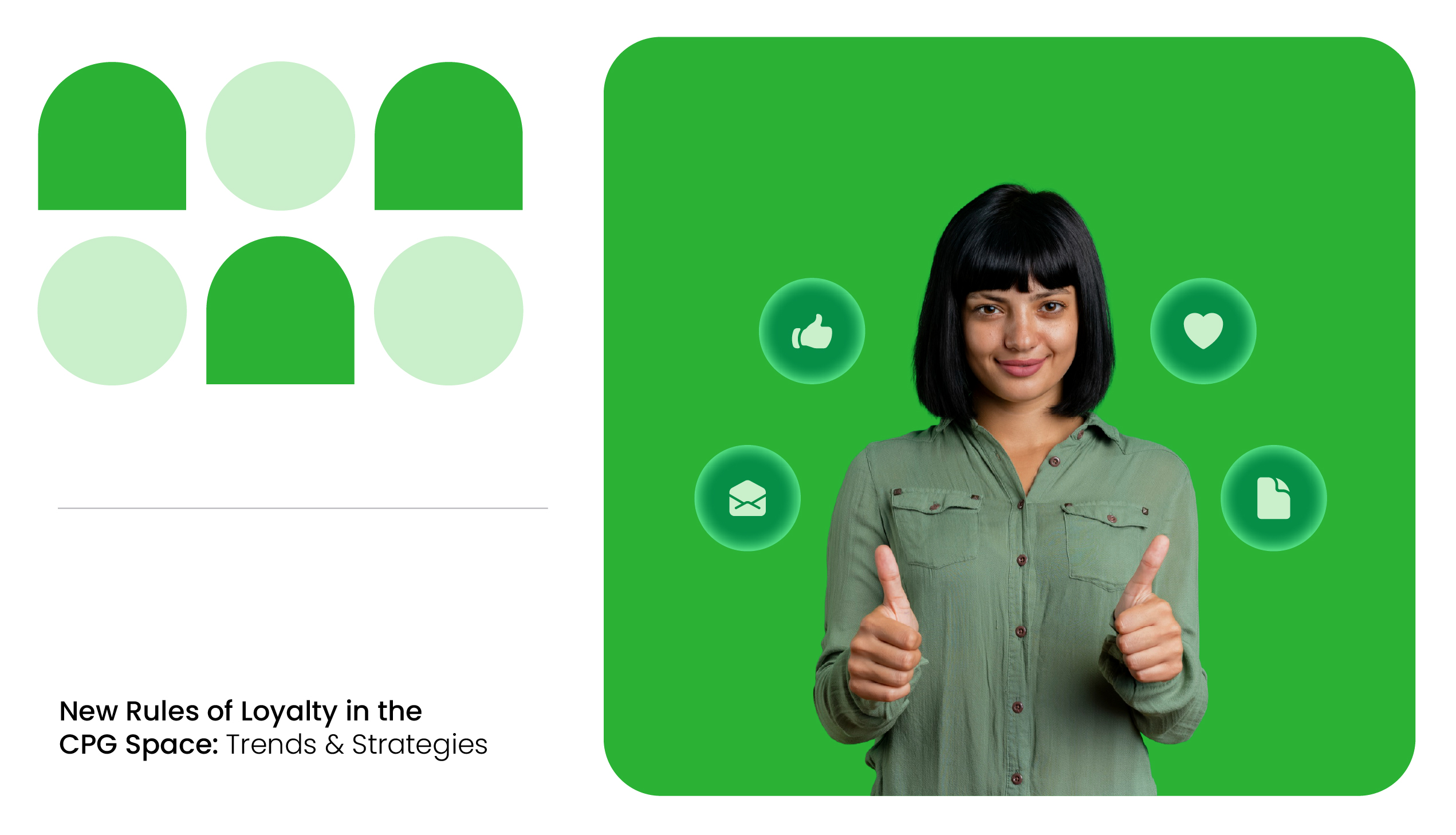boAt is one of the most popular electronic brands in India, with a 24% market share in the wearable devices segment alone. While Amazon and Flipkart remain its largest sales channels, co-founder Aman Gupta recently confirmed that quick commerce has become the company’s third-biggest driver of sales. This marks a clear shift in consumer behavior, where headphones, earphones, and smartwatches are now purchased with the same urgency as groceries or packaged food.
In this report, we analyze the 546 boAt products listed on Instamart between 1 August 2025 and 14 August 2025 across five Delhi pincodes to understand boAt’s business model for quick commerce, and what other brands can learn from it.
boAt’s Business Model: An Overview
boAt operates primarily on a Direct-to-Consumer (D2C) model, through e-commerce platforms such as Amazon and Flipkart, as well as its own website. This approach allows the company to maintain control over pricing, customer service, and brand experience while reducing dependency on traditional retail channels.
With the rise of quick commerce, boAt has adapted this model to meet the growing demand for instant delivery. On platforms like Instamart, the brand ensures that high-demand products are consistently available for rapid delivery. This focus on availability not only improves customer satisfaction but also strengthens boAt’s position in a highly competitive market.
An analysis of 546 boAt products listed on Instamart between 1–14 August 2025 across five Delhi pincodes — 110003 (Jangpura/Defence Colony), 110002 (Daryaganj/ITO), 110006 (Civil Lines/Kashmere Gate), 110005 (Patel Nagar/Karol Bagh), and 110011 (Chanakyapuri/South Avenue) highlights several trends:
- Category dominance: Earbuds and headsets account for nearly half the listings (239), followed by smartwatches (95), speakers (74), and powerbanks/cables (70).
- Pricing and discounts: Average prices range from ₹710 for cables/power banks to ₹2,295 for smartwatches, with discounts averaging 75% and reaching up to 90% on select products.
- Hyperlocal distribution: Listings and delivery times vary sharply across Delhi pincodes. Central areas like Jangpura/Defence Colony have 145 listings with average prices of ₹1,633, while Chanakyapuri has only 41 listings averaging ₹922. Delivery ranges from under 19 minutes in Daryaganj/ITO to nearly 50 minutes in Chanakyapuri.
- Stock availability: boAt maintains a 93% in-stock rate, with higher-priced products more consistently available.
READ MORE | Plugging Into Zepto’s Strategy for Electronics and Appliances: June 2025
The boAt Category Spread: Dominance of Earbuds and Watches
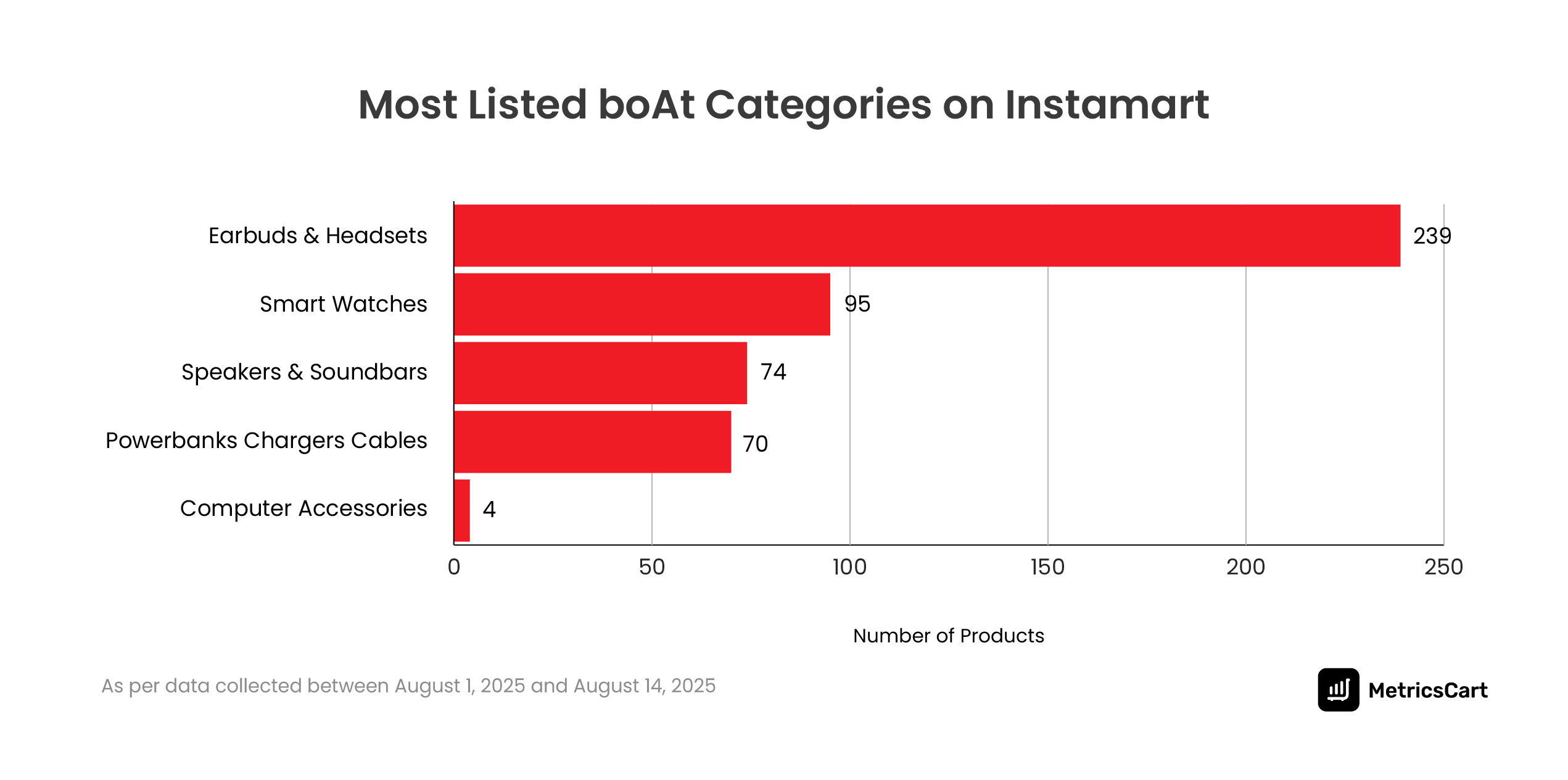
Out of the 546 boAt products listed on Instamart, 239 belong to the Earbuds and Headsets category, making it the single largest product cluster with nearly 44% share of total listings. This dominance reflects India’s broader audio accessory boom, where boAt leads the TWS (True Wireless Stereo) market with a 32.9% share, according to Counterpoint Research.
Smartwatches form the second-largest category, with 95 listings. Average prices hover around ₹2,295, and discounts average 75%. These devices demonstrate boAt’s ability to blend technology, style, and brand appeal, encouraging aspirational purchases even in a hyperlocal, fast-delivery marketplace.
The remaining catalog spreads across charging cables, power banks, speakers, and smaller lifestyle accessories, showing that boAt on quick commerce is not just a list of the brand’s hero products, but also for daily-use essentials that fit quick-delivery buying behavior.
Understanding boAt’s Dual-Pricing Strategy
boAt’s business model effectively balances two key pricing strategies: budget-friendly products for mass adoption and premium devices to maintain the brand’s aspirational appeal.
This dual-pricing approach is evident in the brand’s product offerings on Instamart in Delhi, where it caters to a wide range of consumers, from price-sensitive buyers to those seeking high-end devices.
Among boAt products listed on Instamart, the most affordable items are charging cables, with prices starting at ₹129. Options like the boAt A325 and boAt A750 series dominate this segment, all priced under ₹170, making them the entry point for shoppers looking for budget-friendly accessories.
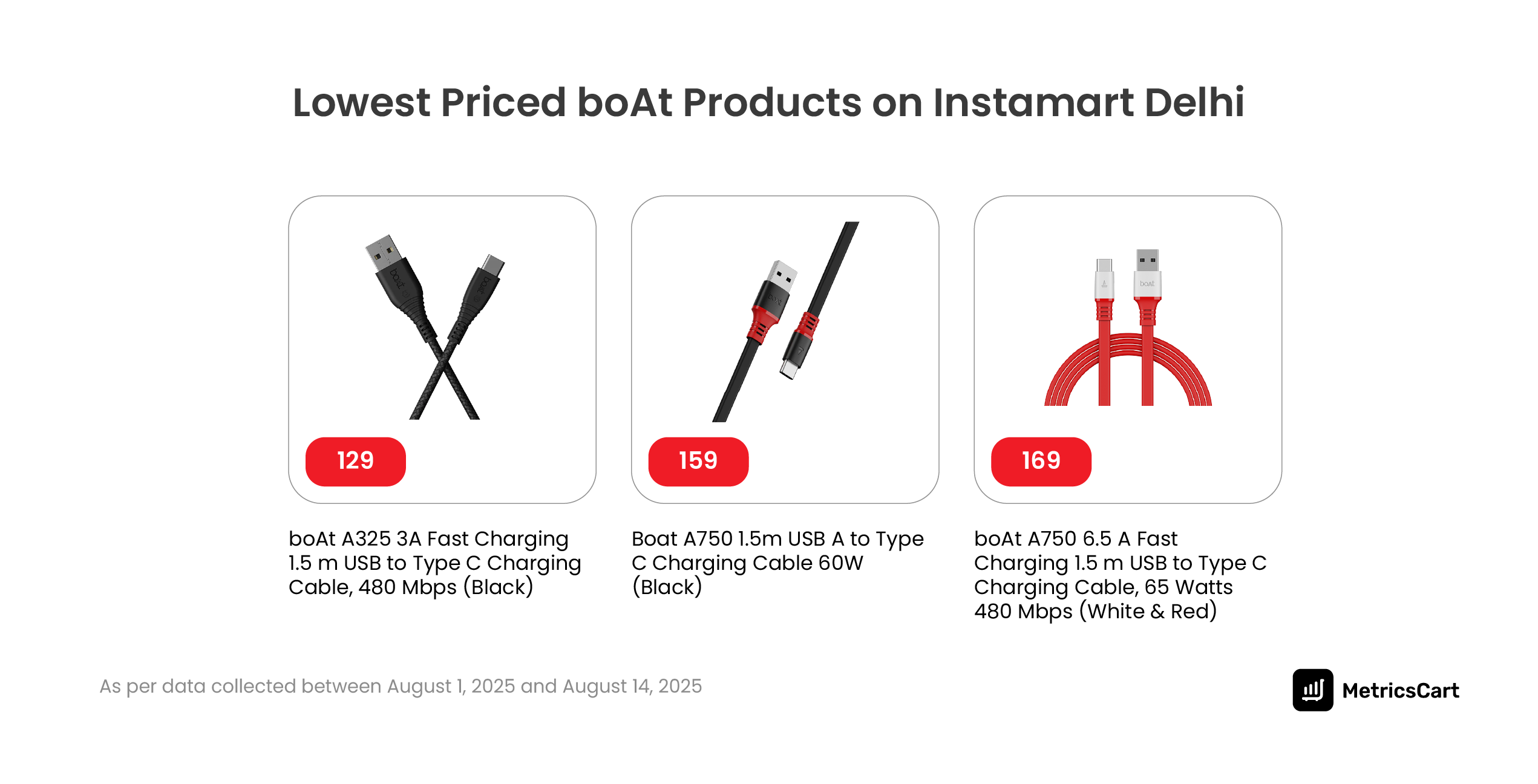
On the other hand, smartwatches are priced between ₹8,999 and ₹9,499. Models like the Chrome Horizon, Ultima Prism, and Lunar Prime represent the premium end of the brand’s range, sitting far above its budget accessories.
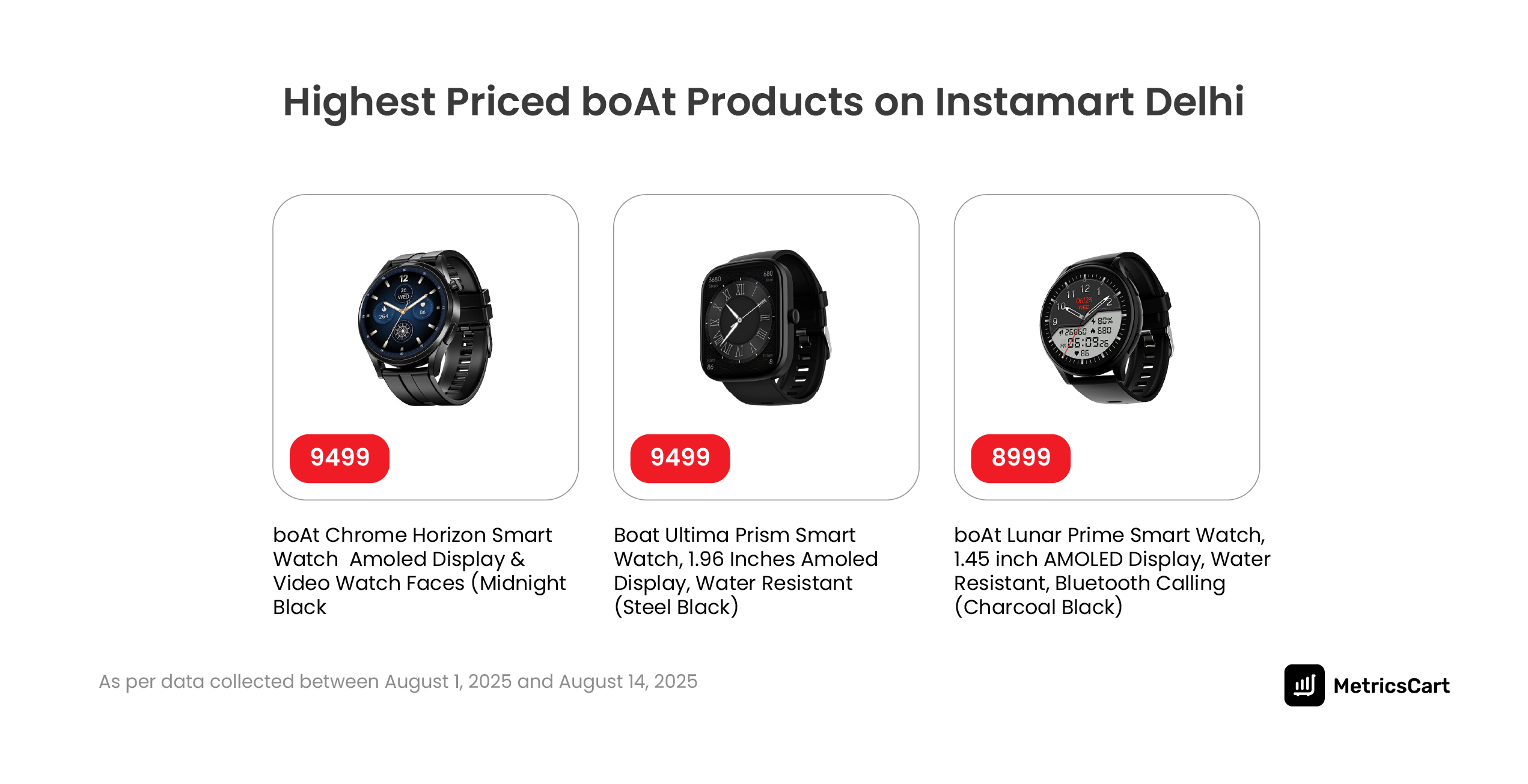
READ MORE | Swiggy Instamart Price Tracker: Monitor Prices, Discounts & Stock Instantly
Discount-Driven Market Engagement
Discounts serve multiple purposes: they incentivize rapid purchase, clear inventory efficiently, and reinforce the perception that a brand consistently offers value.
boAt leverages this in their quick commerce portfolio. The analysis reveals that average discounts on Instamart hover around 75%, with specific products reaching up to 90% off.
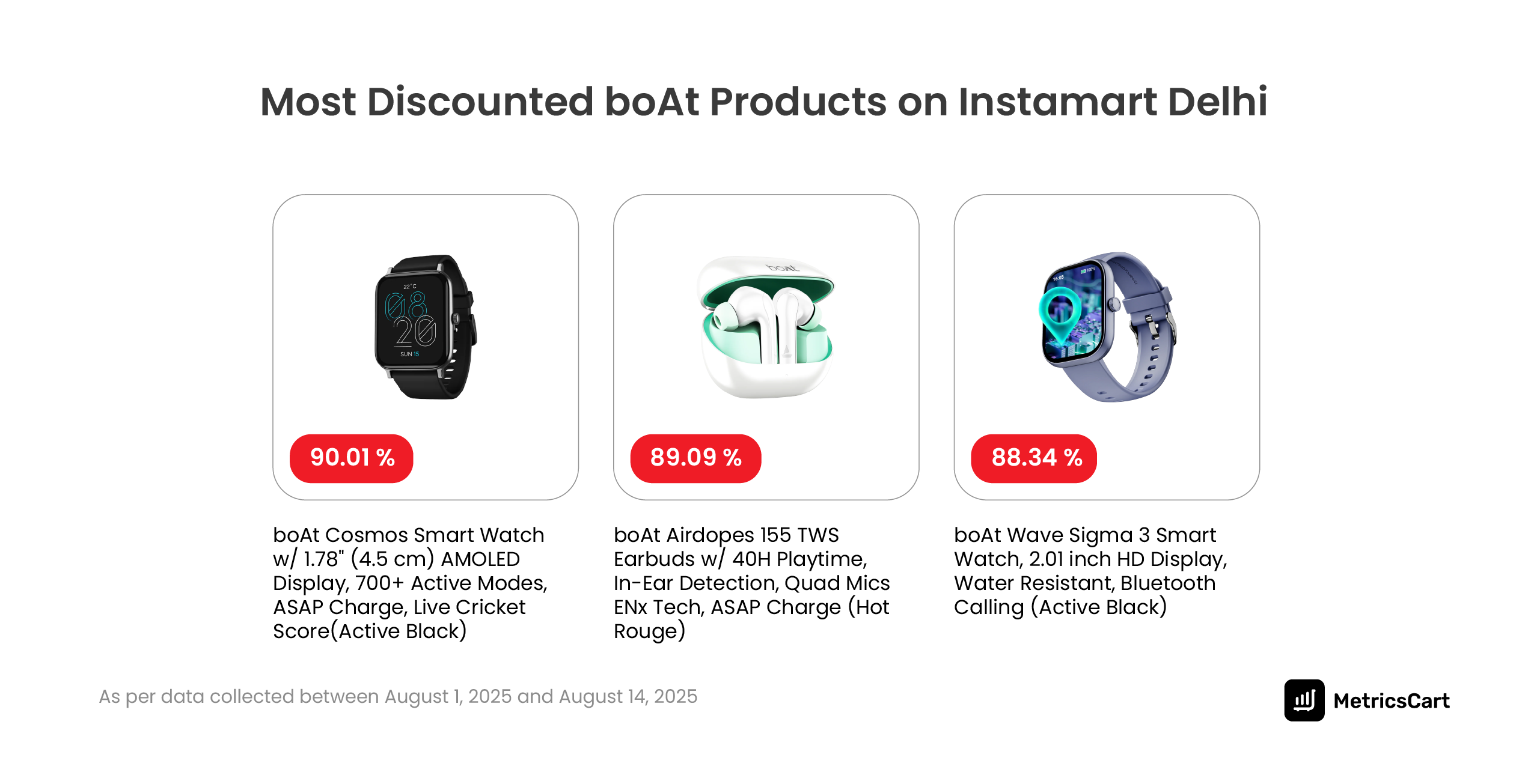
But the discounts are not applied uniformly. Some boAt products on Instamart are listed with exceptionally high discounts, going up to 90% off. The biggest markdowns were seen on smartwatches, such as the Cosmos and Wave Sigma 3, as well as earbuds like the Airdopes 155, all of which were priced with discounts of nearly 90%.
Price and Discount Trends Over Time
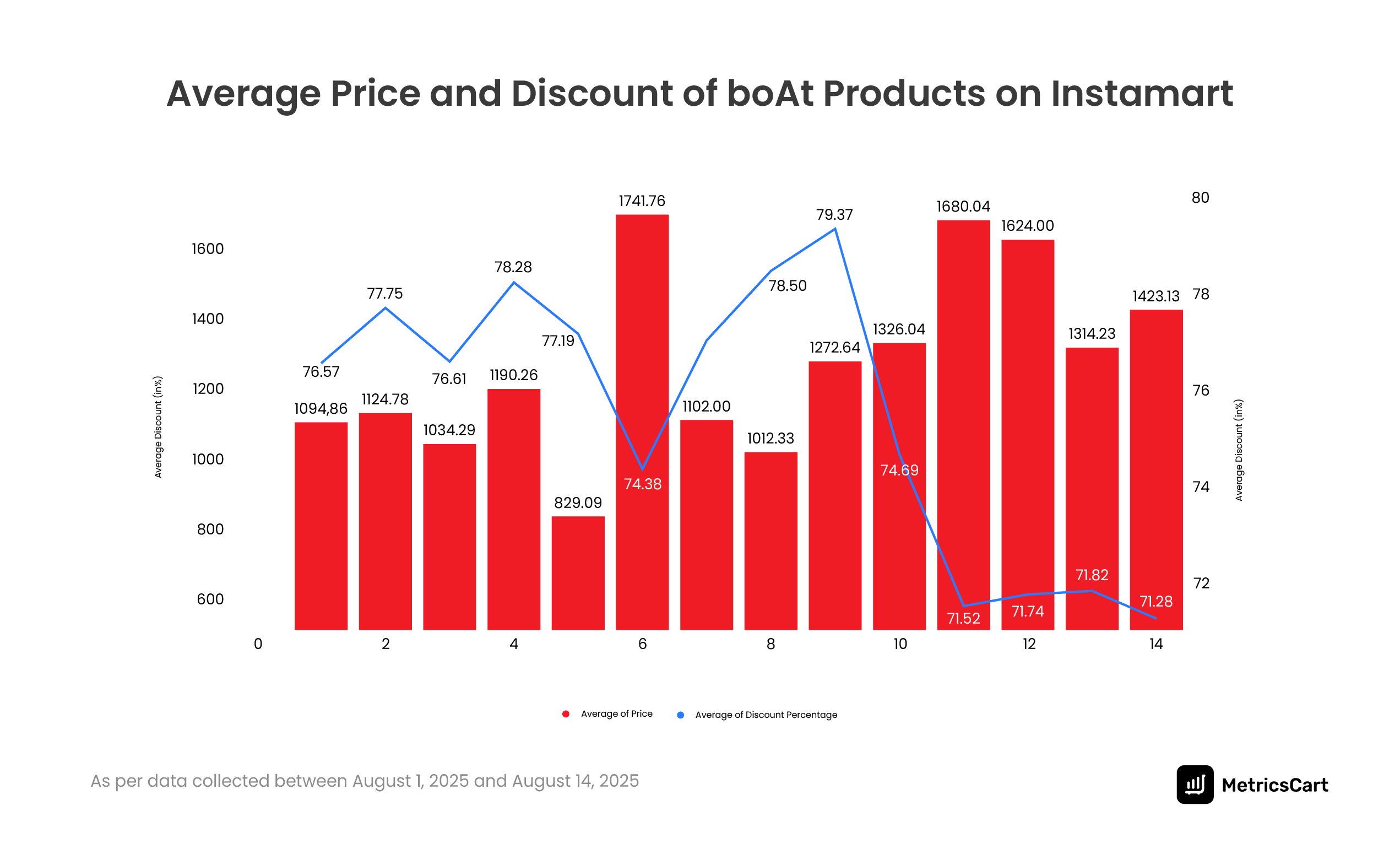
The two weeks of data show an almost textbook example of price-discount correlation. On days when average prices rose, such as August 6, when listings peaked at ₹1,742, discounts dropped to around 74%. When prices fell closer to ₹1,000, discounts increased to around 78%.
By mid-month, prices stabilized above ₹1,300, with discounts cooling to about 71 percent. The strategy is deliberate: push high discounts to move volume when prices are low, and ease off when higher-priced models are in focus.
READ MORE | Future of Electronics in 2025: It Looks Smarter, Greener, And Bigger!
Location Matters: Pincode-Level Insights
One of the most interesting aspects of quick commerce is how it exposes micro-level differences within a single city. Delivery speeds for boAt products on Instamart in Delhi range widely, depending on the neighborhood.
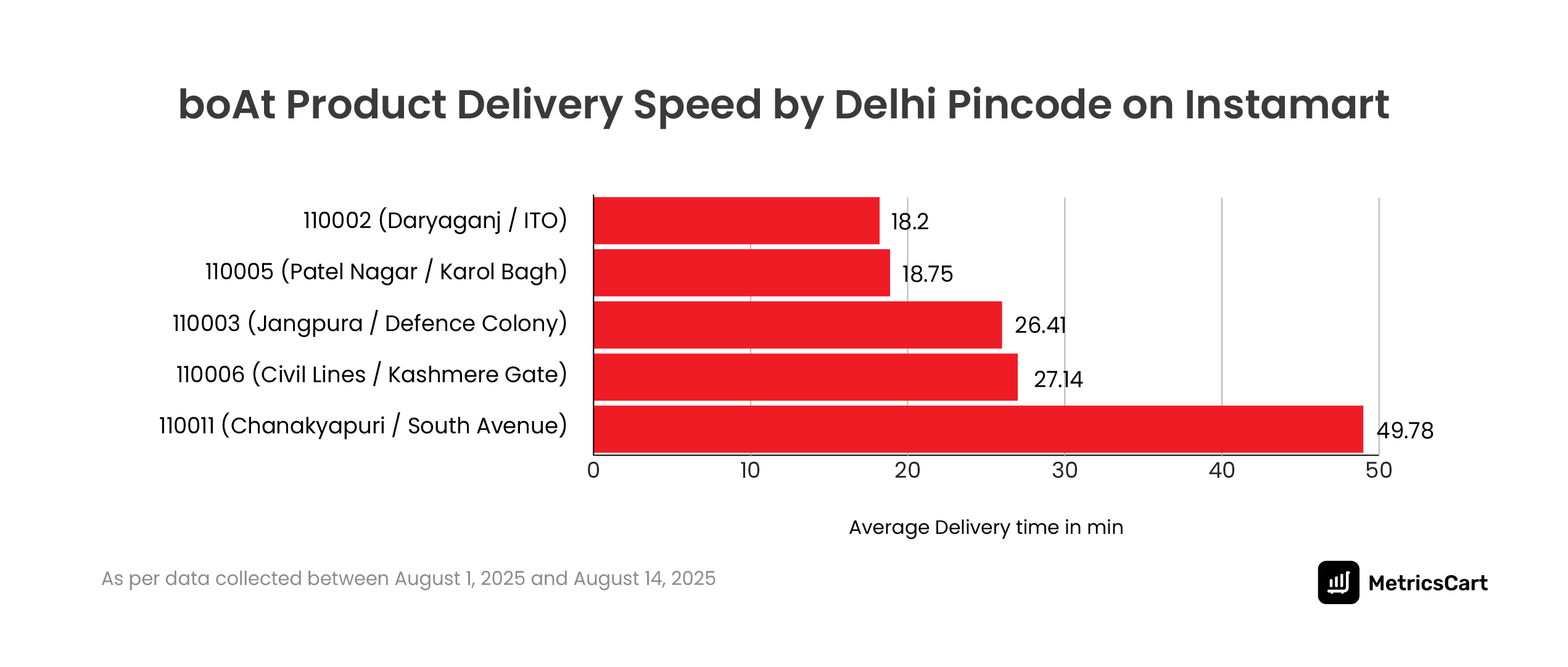
In Daryaganj/ITO and Patel Nagar/Karol Bagh, shoppers get their orders in under 19 minutes on average. Meanwhile, in Chanakyapuri, delivery times stretch to nearly 50 minutes.
Availability is another point of contrast.
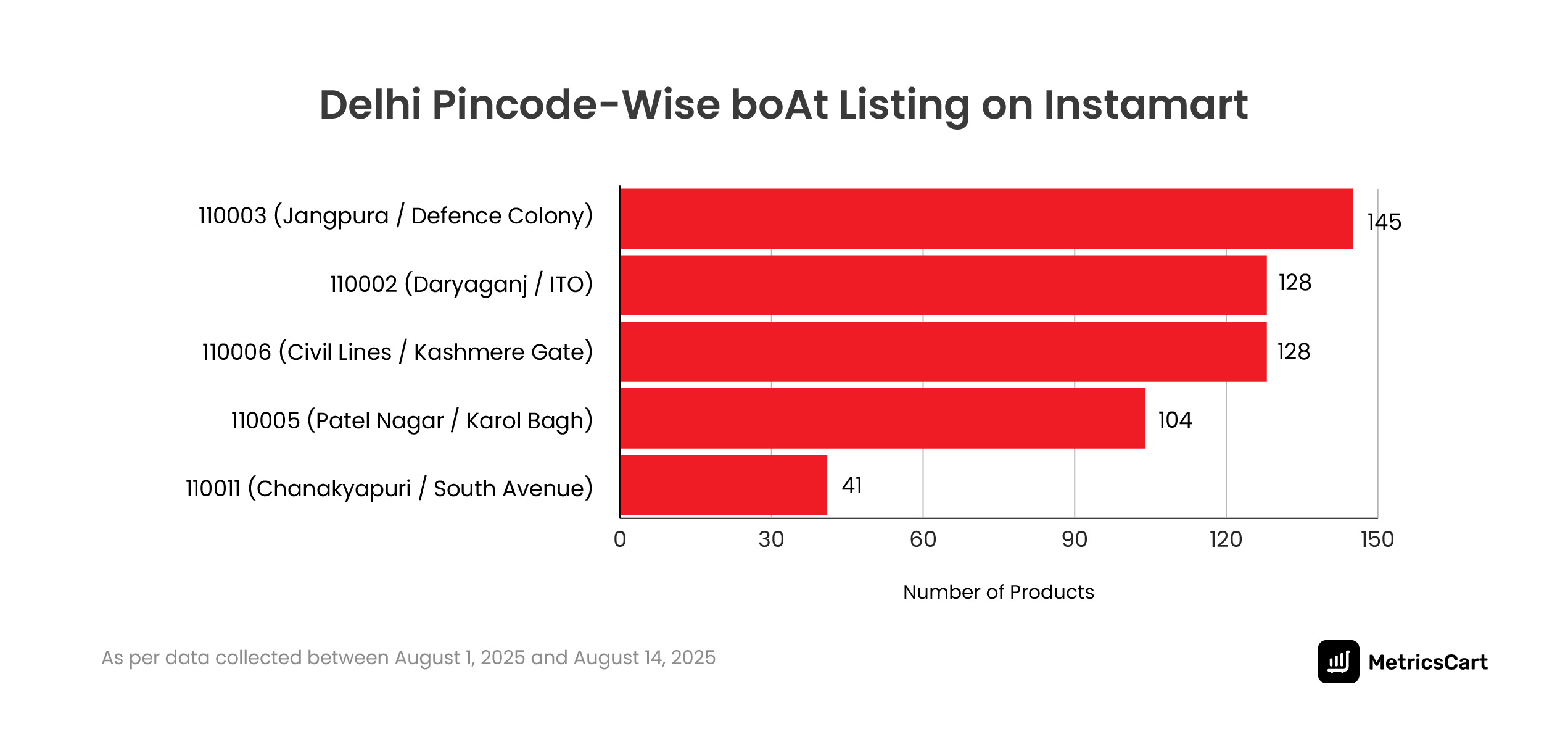
Jangpura/Defence Colony leads with 145 listings, followed by Daryaganj/ITO and Civil Lines/Kashmere Gate with 128 each. Patel Nagar/Karol Bagh has 104, while Chanakyapuri/South Avenue has the fewest at 41.
Average prices also differ sharply: products in Jangpura average around ₹1,633, while those in Chanakyapuri average just ₹922.41.
Other areas, such as Daryaganj/ITO (₹1,244), Civil Lines/Kashmere Gate (₹1,218), and Patel Nagar/Karol Bagh (₹1,201), fall within the mid-range.
This reflects uneven demand density across Delhi, with central areas prioritized over outlying ones.
Stock and Availability Trends
Despite variations by location, boAt maintains a strong presence overall. Out of 546 total product listings during the analysis period, 510 were in stock, representing a 93% availability rate.
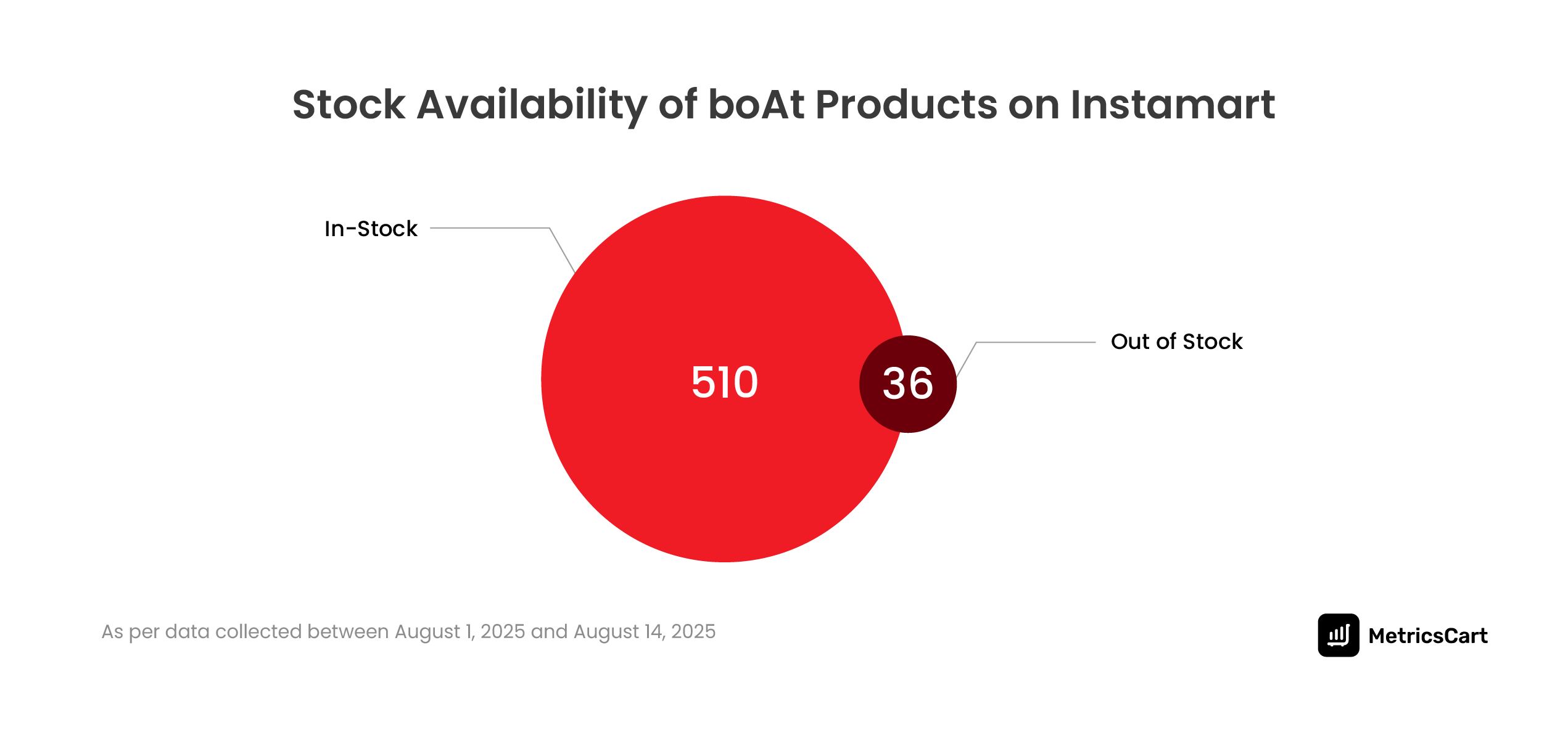
Interestingly, higher-priced products had better availability compared to lower-priced ones. The average price of in-stock products was ₹1,318, compared to ₹1,183 for out-of-stock items. In other words, the premium side of boAt’s catalog seems to enjoy more consistent shelf space, possibly because shoppers are slower to buy expensive items impulsively.
READ MORE | Electronics on Amazon: Insights From Black Friday and Cyber Monday Shopping Frenzy
The boAt Playbook
boAt’s business model for quick commerce teaches how an electronics brand can thrive in a space once dominated by groceries and essentials. The company has revamped its D2C-first model to meet consumer demand for instant delivery, ensuring 93% stock availability across Instamart, following dual-pricing strategies, strategic discounts, and hyperlocal distribution. boAt on Instamart proves quick commerce is not just about logistics. It’s about aligning pricing, product mix, and availability with the psychology of instant gratification.
To replicate boAt’s brand strategy and ensure q-commerce success, you need reliable, real-time data. You must know where stockouts occur, which pin codes demand higher ASPs, or how discounts shift conversion rates to make the difference between experimenting blindly and scaling smartly.
That’s where MetricsCart comes in. With its advanced digital shelf analytics and quick commerce dashboards, MetricsCart helps brands track product availability, pricing trends, competitor benchmarks, and delivery performance in real-time across quick commerce platforms.
Disclaimer: MetricsCart is the exclusive owner of the data used in the Digital Shelf Insights reports. Any kind of third-party usage entails due credit to the source material.
Want to Know How Your Products are Performing in Quick Commerce? Explore MetricsCart Now for Free.

